No sign of Donald Trump’s replacement for obamacare

As a candidate for the White House, Donald Trump repeatedly promised that he would “immediately” replace President Barack Obama’s health care law with a plan of his own that would provide “insurance for everybody.” Back then, Trump made it sound that his plan — “much less expensive and much better” than the Affordable Care Act — was imminent. And he put drug companies on notice that their pricing power no longer would be “politically protected.” Nearly three years after taking office, Americans still are waiting for Trump’s big health insurance reveal. Prescription drug prices have edged lower, but with major legislation stuck in Congress it’s unclear if that relief is the start of a trend or merely a blip. Meantime the uninsured rate has gone up on Trump’s watch, rising in 2018 for the first time in nearly a decade to 8.5 percent of the population, or 27.5 million people, according to the Census Bureau. “Every time Trump utters the words ACA or Obamacare, he ends up frightening more people,” said Andy Slavitt, who served as acting administrator of the Centers for Medicare and Medicaid Services during the Obama administration. He’s “deepening their fear of what they have to lose.” White House officials argue that the president is improving the health care system in other ways, without dismantling private health care. White House spokesman Judd Deere noted Trump’s signing of the “Right-to-Try” act that allows some patients facing life-threatening diseases to access unapproved treatment, revamping the U.S. kidney donation system and the FDA approving more generic drugs as key improvements. Trump has also launched a drive to end the HIV/AIDS epidemic. “The president’s policies are improving the American health care system for everyone, not just those in the individual market,” Deere said. But as Trump gears up for his reelection campaign, the lack of a health care plan is an issue that Democrats believe they can use against him. Particularly since he’s still seeking to overturn “Obamacare” in court. This month, a federal appeals court struck down the ACA’s individual mandate, the requirement that Americans carry health insurance, but sidestepped a ruling on the law’s overall constitutionality. The attorneys general of Texas and 18 other Republican-led states filed the underlying lawsuit, which was defended by Democrats and the U.S. House. Texas argued that due to the unlawfulness of the individual mandate, “Obamacare” must be entirely scrapped. Trump welcomed the ruling as a major victory. Texas v. United States appears destined to be taken up by the Supreme Court, potentially teeing up a constitutional showdown before the 2020 presidential election. In a letter Monday to Democratic lawmakers, House Speaker Nancy Pelosi singled out the court case. “The Trump administration continues to firmly support the recent ruling in the 5th Circuit, which they hope will move them one step closer to obliterating every protection and benefit of the Affordable Care Act,” Pelosi wrote, urging Democrats to keep health care front and center in 2020. Accused of trying to dismantle his predecessor’s health care law with no provision for millions who depend on it, Trump and senior administration officials have periodically teased that a plan was just around the corner. In August, the administrator of the Centers for Medicare and Medicaid Services, Seema Verma, said officials were “actively engaged in conversations and working on things,” while Trump adviser Kellyanne Conway suggested that same month an announcement was on the horizon. In June, Trump told ABC News that he’d roll out his “phenomenal health care plan” in a couple of months, and that it would be a central part of his reelection pitch. The country is still waiting. Meantime Trump officials say the administration has made strides by championing transparency on hospital prices, pursuing a range of actions to curb prescription drug costs, and expanding lower-cost health insurance alternatives for small businesses and individuals. One of Trump’s small business options — association health plans — is tied up in court. And taken together, the administration’s health insurance options are modest when compared with Trump’s original goal of rolling back the ACA. Since Trump has not come through on his promise of a big plan, internecine skirmishes among 2020 Democratic presidential hopefuls have largely driven the health care debate in recent months. Bernie Sanders and Elizabeth Warren are leading the push among liberals for a “Medicare for All” plan that would effectively end private health insurance while more moderate candidates, like Joe Biden, Pete Buttigieg and Amy Klobuchar, advocate for what they contend is a more attainable expansion of Medicare. Brad Woodhouse, a former Democratic National Committee official and executive director of the Obamacare advocacy group Protect Our Care, said it is important for Democrats to “put down the knives they’ve been wielding against one another on health care.” “Instead turn their attention to this president and Republicans who are trying to take it away,” Woodhouse counseled. Some Democratic hopefuls appear to be doing just that. During a campaign stop in Memphis, Tennessee. this month, former New York Mayor Michael Bloomberg called out Trump on health care, saying the president is “determined to throw Americans off the boat, without giving them a lifeline.” Polling suggests Trump’s failure to follow through on his promise to deliver a revamped health care system could be a drag on his reelection effort. Voters have consistently named health care as one of their highest concerns in polling. And more narrowly, a recent Gallup-West Health poll found that 66 percent of adults believe the Trump administration has made little or no progress curtailing prescription drug costs. Prescription drug prices did drop 1 percent in 2018, according to nonpartisan experts at U.S. Health and Human Services. That was the first such price drop in 45 years, driven by declines for generic drugs, which account for nearly 9 out of 10 prescriptions dispensed. Prices continued to rise for brand-name drugs, although at a more moderate pace. Trump’s broadsides against the pharmaceutical industry might well have helped check prices, though drug companies have
Judge Greg Griffin delays decision on suit over Alabama democratic chair

A lawsuit filed by the longtime chair of the Alabama Democratic Party challenging a newly elected leader can continue, at least for now, a judge said Thursday. Montgomery Circuit Judge Greg Griffin said he will wait for a decision from the Alabama Supreme Court in an earlier appeal before deciding whether to dismiss the lawsuit filed by longtime party chair Nancy Worley. “I’m going to let them rule,” Griffin told lawyers during a hearing. State Rep. Chris England and longtime party leader Nancy Worley each claim to be the properly elected party chair. The Democratic National Committee recognizes England as the state party leader after members of the state executive committee elected him this fall. Worley maintains the election was illegitimate and filed a lawsuit to try to block England from taking control. Griffin ruled that the DNC can intervene in the lawsuit. Barry Ragsdale, a lawyer representing the defendants in Worley’s suit, said, while they would prefer to have the lawsuit dismissed, England is functioning as party chair. Ragsdale said the new Democratic Party leaders have access to the state party’s social media accounts and the party headquarters in Montgomery. “The only people in the world that think that Chris England is not the chair of the Democratic Party were sitting at that table in there,” he said in reference to the plaintiffs’ attorneys. Ragsdale called the lawsuit Worley’s “last thread of trying to hang onto power.” Attorney Bobby Segall, who represents Worley and other plaintiffs, said it made sense to wait for the Supreme Court since the cases involved similar issues. Joe Reed, the party’s longtime vice chair for minority affairs and a supporter of Worley, attended the court hearing. Reed said a “party divided cannot win.” Reed predicted the legal fight will end up in federal court, arguing that new additions to the State Democratic Executive Committee violate a consent decree from the 1990s involving how committee members are selected. Republished with the Permission of the Associated Press.
Democrats aim to catch up to Donald Trump’s 2020 cash advantage
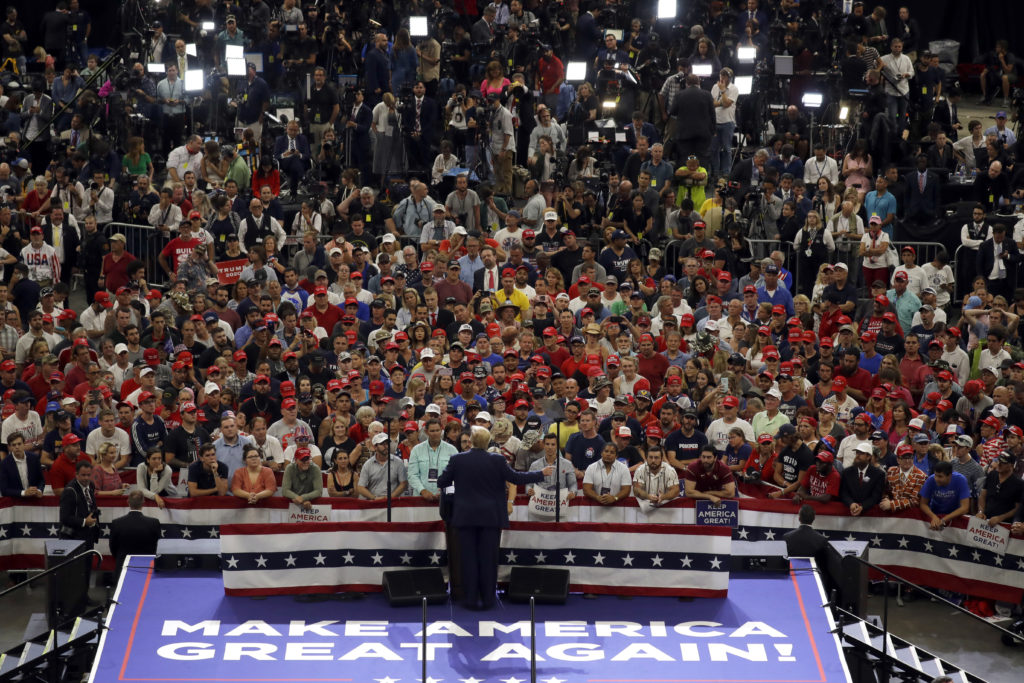
Democrats are narrowing President Donald Trump’s early spending advantage, with two billionaire White House hopefuls joining established party groups to target the president in key battleground states that are likely to determine the outcome of next year’s election. Priorities USA and American Bridge, two of the leading Democratic outside groups, are ramping up operations. The organization ACRONYM recently pledged to spend $75 million. And former New York Mayor Michael Bloomberg has pledged to spend $100 million on ads targeting Trump, while California billionaire Tom Steyer promised $50 million. The billionaires have come under fire from some Democratic rivals for trying to buy the presidency. But the influx of cash is soothing anxiety in some corners of the party that Trump, who has repeatedly broken fundraising records, was off to an unprecedented early start in the 2020 advertising wars. Some had argued that the Democrats’ overwhelming focus on the sprawling presidential primary field allowed the president to burnish a reelection narrative unchallenged ahead of what is expected to be an exceptionally close election. “It’s safe to say the gap is closing,” said David Brock, who leads several Democratic groups, including American Bridge. “People can breathe a little bit of a sigh of relief that there is a major Democratic response now and that Trump’s spending will be met.” The money has put Democrats on firmer footing in states such as Florida, Wisconsin, Michigan, Pennsylvania, North Carolina and Arizona, which will be key to victory in 2020. But it’s unclear how long it will last. Trump has built a massive money-raising machine that has fused a traditional network of big-dollar Republican donors with a sophisticated digital operation that has raked in small contributions from rank-and-file supporters. Sitting presidents have long used their office to draw a spotlight and rake in money while the party out of power fights its way through a primary. Trump, however, never really ceased campaigning and has been running for reelection essentially since taking office, giving him a far earlier head start. For months, his campaign has spent comparatively little on digital advertising in battlegrounds, while dumping money in population-dense states like New York, California and Texas, which are rich in potential donors but won’t decide the outcome of the election. Yet the money he is raising there will enable him to flood important states with advertising early next year. Over the summer, the lack of spending fueled worries — and some snipping — that not enough was being done counter Trump. “We welcome other efforts. But we also need to remember that Trump has yet to start spending money big in swing states,” said Patrick McHugh, the executive director of Priorities USA, which spent roughly $200 million during the 2016 election. “Matching dollar for dollar now would come at the detriment of matching his spending online and on television once he begins spending in earnest in states that matter.” While the economy overall has performed well during Trump’s presidency, Priorities is driving a message that aims to move beyond the toplines and connect peoples’ frustration with their own financial well-being directly to the president. The group has yet to say how much it will spend on the 2020 contest, but it has outspent Trump $6.5 million to $2.2 million since July on Facebook and Google in Florida, Wisconsin, Pennsylvania and Michigan. American Bridge, which has traditionally focused on conducting opposition research, has launched a $50 million radio, TV and digital advertising campaign in the same states that is geared toward rural and exurban voters in about 80 counties that Barack Obama carried but later switched to Trump. “It’s a margins game that we’re playing, but we think that we can get enough people to defect,” Brock said. The group ACRONYM will spend $75 million between now and Election Day on online advertising highlighting the “broken promises” and perceived corruption of the Trump administration. Recent ads have attacked Trump for failing to deliver on his pledge to bring manufacturing jobs back to the U.S. by highlighting the decision by General Motors to close its Lordstown, Ohio, plant. Organizations financed by Steyer, meanwhile, are working to register young people to vote. That includes a door-knocking campaign, as well as digital advertising by NextGen America, where he was president until stepping down over the summer to launch his campaign. An early salvo of ads run by Bloomberg accuses Trump of not caring about health care and questions his temperament and social media use. One recent Facebook ad captioned “What did he tweet today?” features an image of a man facepalming his forehead. “The president is out making his case. And we’ve got to make sure that he doesn’t make it unrebutted,” said Bloomberg chief adviser Howard Wolfson. Since Trump took office, many Democrats have celebrated an outpouring of small-dollar online contributions from an energized grassroots base. Some progressives have touted this success as a viable alternative to the party’s historic reliance on wealthy donors, whom they criticize for having outsized influence. But the reality is both streams of money will be needed against Trump. Particularly before the nominee is chosen, outside groups and the Democratic National Committee — they depend on major donors to finance their efforts — will be handling the lion’s share of general-election work. During a recent DNC fundraiser headlined by Obama, tech CEO and philanthropist Amy Rao fired up a well-heeled crowd of about 100 who gathered at the home of megadonor Karla Jurvetson, high in the hills overlooking Silicon Valley. Defeating Trump, she said, was so important that they should be digging in to their “retirement and what you thought you were going to leave to your children” to support the party regardless of who becomes the nominee. She encouraged the crowd to give “so much that it actually hurts.” “It’s only money. You’ll never miss it,” Rao said. “The biggest gift you can give to the generations that follow us is to make sure this president loses in 2020.” AP National Political Writer Steve Peoples in New
Judge Greg Griffin schedules hearing in democratic party dispute

The legal fight over who is in control of the Alabama Democratic Party is dragging onward. Montgomery Circuit Judge Greg Griffin has scheduled a Dec. 5 hearing on a motion to dismiss the lawsuit filed by one side of the ongoing squabble. Both State Rep. Chris England and longtime party leader Nancy Worley claim to be the properly elected party chair. The Democratic National Committee recognizes England as the state party leader after members of the state executive committee elected him this month. Worley maintains the election was illegitimate and filed a lawsuit to try to block England from taking control. The two factions have been battling for control of the party. Republished with the permission of the Associated Press.
Judge Greg Griffin won’t recuse in Alabama Democratic Party dispute

An judge on Thursday refused to step aside in a lawsuit over who is in control of the Alabama Democratic Party as one side of the dispute pushed for the case to be dismissed. Montgomery Circuit Judge Greg Griffin said he won’t recuse in the lawsuit brought by longtime chair Nancy Worley. Defendants had asked Griffin to step aside because of longstanding ties to party officer Joe Reed, who supports Worley. Griffin did not elaborate on his reasons in the one-page order. Both Worley and state Rep. Chris England say they are the properly elected party chair. Worley and Vice-Chair Randy Kelley had filed the lawsuit to try to block the Nov. 2 meeting where England was elected. They argue his election is illegitimate. Barry Ragsdale, an attorney representing England and other defendants, said the issue of control has been settled since England and new vice-chair Patricia Todd have been elected. National party officials recognize their election, he said. “Worley and Kelley desperately want to ignore those overwhelming decisions by the ADP and cling to the twilight of their days in power,” attorneys for defendants in the case wrote. The Democratic National Committee has certified England and Todd as the new state party leaders, according to the motion to dismiss the lawsuit. DNC Chairman Tom Perez sent England and Todd a letter congratulating them on their elections. Republished with the permission of the Associated Press.
Representative Chris England elected new Alabama Democratic chair; infighting continues
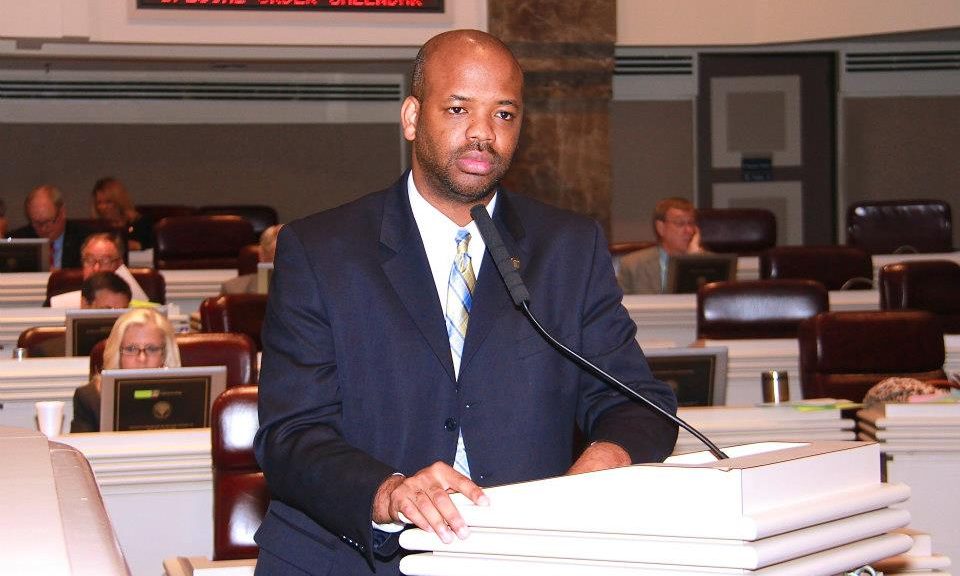
An Alabama state representative was elected chair of the Alabama Democratic Party on Saturday after months of in-house bickering about the party’s leadership. But the election may not settle the ongoing battle between two factions of the party over governance and leadership, as the previously elected chair said she would not step down. Rep. Christopher England, of Tuscaloosa, received 104 of 171 ballots cast at the meeting of the State Democratic Executive Committee, the state party’s governing body, The Montgomery Advertiser reported. “Elected officials had to stand in the gap and create the platform the party did not have,” England said before the vote. “You’ve seen me stand for the issues that matter to us.” The vote came after the approximately 175 members of the SDEC voted 172 to 0 to remove Chair Nancy Worley and Vice-Chair Randy Kelley. After the vote, Worley said she was reelected in 2018 and she intends to continue leading the party. “The true SDEC members did not elect two new officers in our places today,” Worley said in a statement. “Randy and I look forward to continuing our leadership roles.” But the meeting represented a win for a group of Democrats opposed to Worley, who has chaired the state Democratic Party since 2013, and the Democratic National Committee, which ordered the state party in February to hold new elections and revise its bylaws to provide greater diversity on the SDEC. England, 43, a city attorney for Tuscaloosa, has served in the Alabama Legislature since 2006. He has been at the forefront of attempts to change the leadership and direction of the party and pledged before the vote to work to “leave no stone unturned” in rebuilding the party. He promised to rebuild local county organizations and staff up the state party. “As we kick the old folks out, the new folks are coming in,” he said. “We want to seize on that energy. We’re going to raise money, money like you’ve never seen.” Former Rep. Patricia Todd, Democrat-Birmingham, was elected vice-chair. Worley has previously accused the DNC of sending contradictory instructions and of trying to dilute the strength of African American voters in the party. The DNC said Worley missed deadlines and was nonresponsive to instructions. Without the orders implemented, the DNC refused to ratify the state’s delegate selection plan and warned that inaction by the state party could prevent Alabama from being seated at next year’s Democratic National Convention. That would effectively invalidate votes cast in next March’s Democratic presidential primary. A group of SDEC members, backed by U.S. Sen. Doug Jones, drafted a new set of bylaws that were approved by the DNC in September. The members then got a majority of the SDEC to vote to hold a meeting to ratify those bylaws on Oct. 5. At that meeting, the members set leadership elections for Nov. 2. Worley proceeded with her own meeting on Oct. 12, which ratified a second set of bylaws — not approved by the DNC — and set elections for Nov. 16. On Wednesday, Worley and Kelly sued to stop the meeting of the Democrats. Montgomery Circuit Judge Greg Griffin blocked the meeting in a decision late Friday, ruling that it would cause “chaos and confusion.” But the Alabama Supreme Court stayed the order about two hours later, allowing the gathering to proceed. The new party bylaws preserve the Minority Caucus to nominate African Americans to the SDEC. But they also create new caucuses to nominate Hispanics, Asians, Native Americans, LGBTQ individuals, youth and those with disabilities. Approximately 68 people were seated from the youth, Hispanic, Native American and Asian/Pacific Islander caucuses on Saturday. Information from: Montgomery Advertiser, http://www.montgomeryadvertiser.com. Republished with the permission of the Associated Press.
Democrats push candidates to fully commit to 2020 nominee
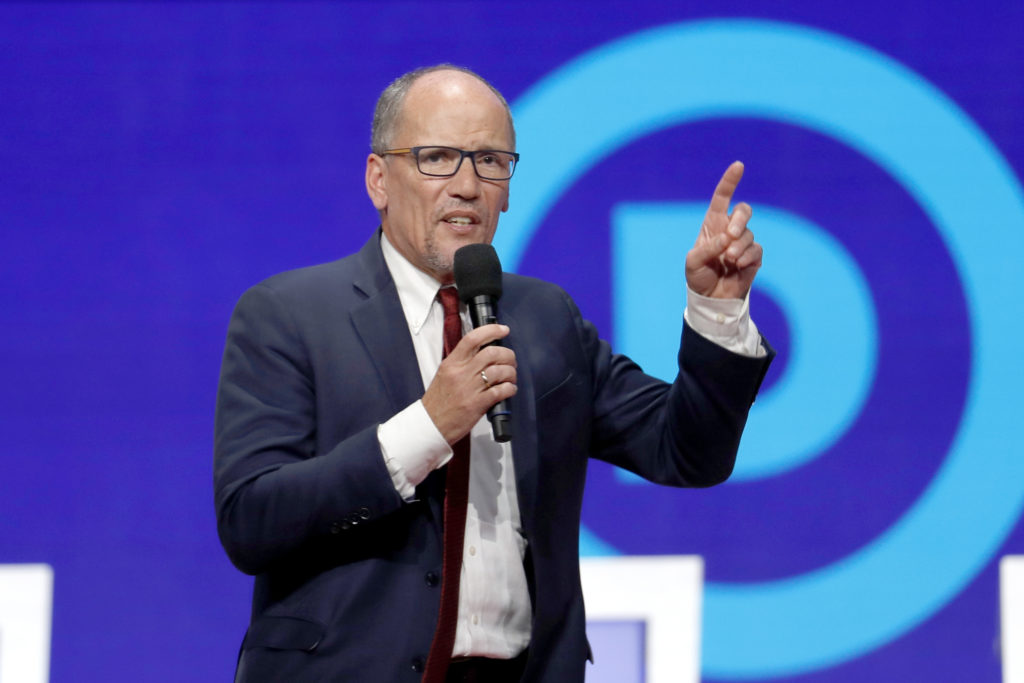
The Democratic National Committee is increasing pressure on its presidential candidates to commit to campaign actively for the party’s nominee in 2020, going beyond a previous loyalty pledge for White House hopefuls. The push from Chairman Tom Perez is part of a wide-ranging strategy designed to prevent the mistakes that cost Democrats the 2016 presidential election. It comes as the Republican National Committee continues to dwarf the Democratic Party in fundraising, while Democrats face the prospect of a bruising, expensive nominating fight that could last well into election year. “We’ll need every Democrat working together in order to defeat Donald Trump,” Perez said, repeating his pledge for a full national campaign even as most Democrats remain focused on the primary campaign. As an example, the DNC holds up former President Barack Obama, who is already raising money and remains neutral in a nominating fight that includes his vice president, Joe Biden, and who is already raising money for the party. An Oct. 25 email from Obama to grassroots donors produced the party’s best online fundraising day of the cycle, the DNC said, and the former president will headline a fundraising gala in California in November. DNC officials say Obama has already talked with party leaders about campaigning on behalf of the nominee, whoever it is. Perez is asking all candidates to commit, like Obama, to serve as surrogates, with a focus on battleground states in the weeks after the July 13-16 nominating convention in Milwaukee. And Perez wants each campaign, as candidates drop out, to designate a senior adviser to serve as a liaison to help the national party use the vestiges of individual candidates’ campaigns to build out Democrats’ general election campaign. DNC officials say the effort isn’t targeted at any campaign. But since President Donald Trump’s 2016 election, Democratic power players have lamented the bitterness that lingered among many supporters of Bernie Sanders after he lost the nomination to Hillary Clinton. Sanders endorsed and campaigned for Clinton, but some of his supporters never fully embraced her candidacy, and some Clinton loyalists blamed them for her narrow losses in key states like Wisconsin, Michigan and Pennsylvania. DNC officials say the overall purpose of what Perez calls a “unity effort” is to pool all Democratic resources, making them available to state parties in battleground states to benefit the presidential nominee and all other Democrats running for lower offices. Perez already has required candidates to pledge explicitly to support the nominee. Candidates also have been asked to help the party raise money and, as a condition of getting the DNC’s national voter file, pledge to give back the additional data they gather on voters once they drop out of the presidential race. The DNC says 10 candidates to date have sent fundraising emails and 15 have participated in fundraising events. That list includes Elizabeth Warren, who has shunned high-dollar fundraisers for her own campaign but agreed to help the party with events that include wealthy donors who legally can give the party hundreds of thousands of dollars. Sanders, Warren’s chief rival for the Democrats’ progressive faction, has sent a fundraising email but hasn’t yet hosted a DNC fundraiser. Sanders’ campaign says he is willing to attend such events provided they are open to low-dollar donors. Both Sanders and Warren have criticized Biden for leaning on wealthy donors and accepting the help of an independent political action committee that can accept unlimited contributions from individuals and corporations. The data requirements, meanwhile, are part of Democrats’ attempts to catch up to a Republican data operation that surprised the Clinton campaign in 2016 and to avoid the scenario under Obama, whose campaign ran its own sophisticated data operation but never fully integrated it with the party. Sanders also never turned over his voter data after ending his 2016 bid. By Bill Barrow Associated Press. Republished with the permission of the Associated Press.
Alabama Democratic Party dispute heads to court

A dispute over control of the Alabama Democratic Party is headed to court. Alabama Democratic Party Chair Nancy Worley and others filed a lawsuit Wednesday seeking to stop a faction of the party’s governing committee from meeting this weekend to elect new leaders. The lawsuit contends the scheduled Saturday meeting, where the reform group intends to elect a new chair, is unauthorized and is being held “illegally.” “Plaintiffs contend that any officers and at-large members purportedly elected on Nov. 2, 2019, will have been improperly elected and may not serve,” the lawsuit states. Montgomery Circuit Judge Greg Griffin has scheduled a Thursday morning hearing on the request to block the meeting. The lawsuit is the latest twist in an ongoing struggle that has split the party’s executive committee into two factions. On one side is a reform group whose actions have been approved by the Democratic National Committee. On the other are members aligned with Worley and Joe Reed, the party’s vice chairman of minority affairs. Both sides had predicted the dispute would ultimately end up in court. The lawsuit names reform group organizers as defendants in the lawsuit. State Rep. Chris England, a defendant in the lawsuit, said he is comfortable the Nov. 2 meeting has been properly authorized. “I honestly don’t see how a court has jurisdiction to enjoin a meeting of this sort,” England said. The DNC directed the Alabama party to hold new elections for chair and vice chair and update bylaws to provide for the representation of more minorities and underrepresented groups in the party including Hispanics, LGBTQ individuals and young voters. State party leaders and the DNC have been engaged in a lingering dispute over those bylaws. The reform group held an Oct. 5 meeting in which about 78 of the more 200 executive committee members adopted new bylaws and scheduled the Nov. 2 meeting. The DNC has said those bylaws are binding on the party. The lawsuit argues the meeting was not properly called and the bylaws and the Nov. 2 meeting are invalid. Worley said Wednesday night that they had tried unsuccessfully to compromise with the “breakaway” group. “We believe the breakaway group has caused enough chaos in the Party; therefore, we hope the Court can take steps to remedy this problem,” Worley said. The dispute comes as the Nov. 8 deadline approaches for Democratic candidates to file paperwork with the state party to run in the 2020 elections. Republished with the permission of the Associated Press
Shifting explanations for withholding aid draw GOP alarm
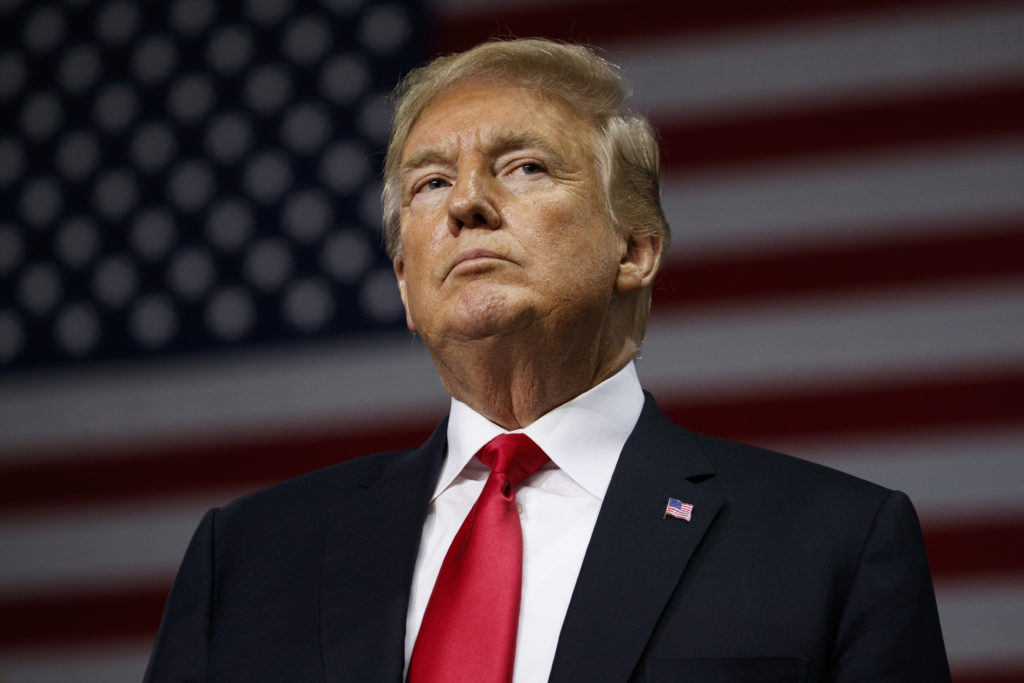
The shifting White House explanation for President Donald Trump’s decision to withhold military aid from Ukraine drew alarm Friday from Republicans as the impeachment inquiry brought a new test of their alliance. Trump, in remarks at the White House, stood by his acting chief of staff, Mick Mulvaney, whose earlier comments undermined the administration’s defense in the impeachment probe. Speaking Thursday at a news conference, Mulvaney essentially acknowledged a quid pro quo with Ukraine that Trump has long denied, saying U.S. aid was withheld from Kyiv to push for an investigation of the Democratic National Committee and the 2016 election. He later clarified his remarks. Trump appeared satisfied with Mulvaney’s clarification and the president dismissed the entire House inquiry as “a terrible witch hunt. This is so bad for our country.” But former Ohio Gov. John Kasich, who ran against Trump in the 2016 Republican primary, said he now supports impeaching the president. Mulvaney’s admission, he said, was the “final straw.” ”The last 24 hours has really forced me to review all of this,” Kasich said on CNN. In Congress, at least one Republican, Rep. Francis Rooney of Florida, spoke out publicly, telling reporters that he and others were concerned by Mulvaney’s remarks. Rooney said he’s open to considering all sides in the impeachment inquiry. He also said Mulvaney’s comments cannot simply be undone by a follow-up statement. “It’s not an Etch-A-Sketch,” said Rooney, a former ambassador to the Holy See under President George W. Bush. “The only thing I can assume is, he meant what he had to say — that there was a quid pro quo on this stuff,” he said. The tumult over Mulvaney’s remarks capped a momentous week in the impeachment investigation as the admission, from highest levels of the administration, undercut the White House defense and pushed more evidence into the inquiry. GOP leaders tried to contain the fallout. But four weeks into the inquiry, the events around Trump’s interaction with the Ukraine president, which are are at the heart of impeachment, have upended Washington. The Energy Secretary, Rick Perry, who has been caught up in the probe, announced his resignation. A beloved House chairman, Rep. Elijah Cummings, Democrat-Maryland, a leading figure in the investigation, died amid ongoing health challenges. The march toward an impeachment vote now seems all but inevitable, so much so that the highest-ranking Republican, Senate Majority Leader Mitch McConnell, privately told his GOP colleagues this week to expect action in the House by Thanksgiving with a Senate trial by Christmas. Speaker Nancy Pelosi has given no timeline for conclusion but wants the inquiry completed “expeditiously.” She said Thursday that facts of the investigation will determine next steps. “The timeline will depend on the truth line,” she told reporters. This week’s hours of back-to-back closed-door hearings from diplomats and former top aides appeared to be providing investigators with a remarkably consistent account of the run-up and aftermath of Trump’s call with Ukraine President Volodymy Zelenskiy. In that July call, Trump asked the newly elected Zelenskiy for a “favor” in investigating the Democratic National Committee’s email situation, which was central to the 2016 election, as well as a Ukraine gas company, Burisma, linked to the family of Trump’s 2020 Democratic rival, Joe Biden, according to a rough transcript of the phone conversation released by the White House. Republican leaders tried to align with Trump Friday, amid their own mixed messages as House Democrats, who already issued a subpoena to Mulvaney for documents, now want to hear directly from him. Rep. Kevin McCarthy, the House GOP leader, cited Mulvaney’s clarification as evidence that there was no quid pro quo. He said witnesses have also testified similarly behind closed doors in the impeachment inquiry. “We’ve been very clear,” McCarthy said. “There was no quid pro quo.” Lawmakers involved in the three House committees conducting the investigation want to hear more next week, which promises another packed schedule of witnesses appearing behind closed doors. Republicans want the interviews made open to the public, including releasing transcripts. Democrats in the probe being led by Rep. Adam Schiff, chairman of the Intelligence Committee, are keeping the proceedings closed for now, partly to prevent witnesses from comparing notes. Three House committees investigating impeachment have tentatively scheduled several closed-door interviews next week, including one with Bill Taylor, the current top official at the U.S. Embassy in Ukraine. Taylor’s interview, scheduled for Tuesday, is significant because he was among the diplomats on a text message string during the time around the July phone call. He raised a red flag and said it was “crazy” to withhold the military aid for a political investigation. It’s unclear whether all the witnesses will appear, given that the White House is opposing the inquiry and trying to block officials from testifying. The schedule includes a mix of State Department officials and White House aides. By Lisa Mascaro, Andrew Taylor, Mary Clare Jalonick Associated Press Republished with the permission of the Associated Press
Democratic debate: Top 2020 contenders finally on same stage
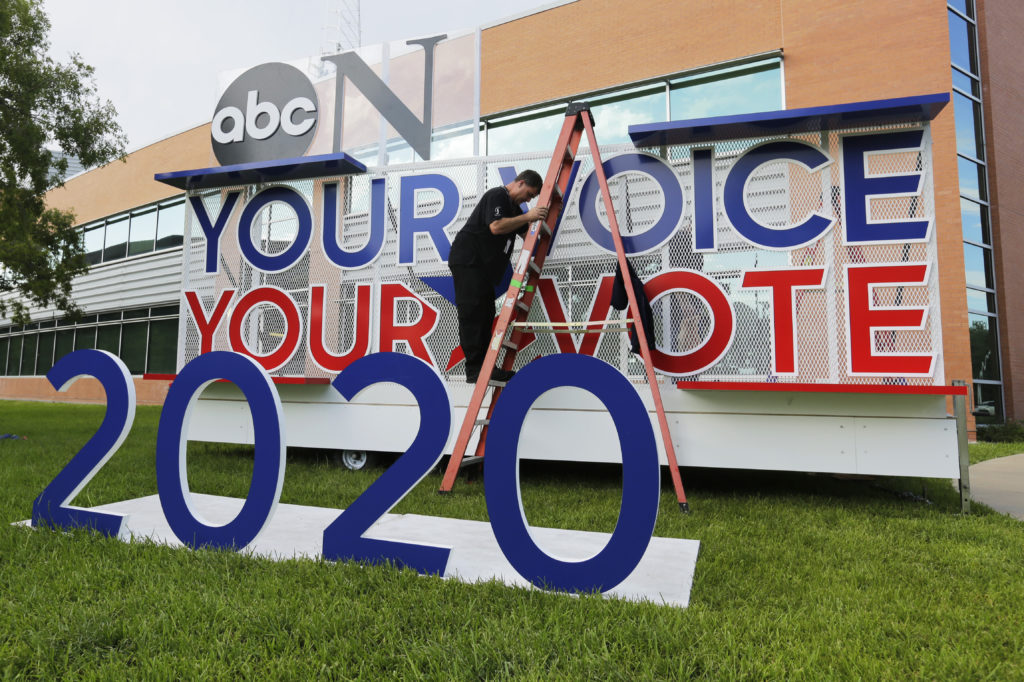
Progressive Democrats Elizabeth Warren and Bernie Sanders share the debate stage for the first time with establishment favorite Joe Biden Thursday night in a prime-time showdown displaying sharply opposing notions of electability in the party’s presidential nomination fight. Biden’s remarkably steady lead in the crowded contest has been built on the idea that the former vice president is best suited to defeat President Donald Trump next year — a contention based on ideology, experience and perhaps gender. Sanders and Warren, meanwhile, have repeatedly criticized Biden’s measured approach, at least indirectly, by arguing that only bold action on key issues like health care, the economy and climate change can build the coalition needed to win in 2020. The top-tier meeting at center stage has dominated the pre-event talk, yet each of the other seven candidates hopes for a breakout moment with the attention of the nation beginning to increase less than five months before the first primary votes are cast. “For a complete junkie or someone in the business, you already have an impression of everyone,” said Howard Dean, who ran for president in 2004 and later chaired the Democratic National Committee. “But now you are going to see increasing scrutiny with other people coming in to take a closer look.” The ABC News debate is the first limited to one night after several candidates dropped out and others failed to meet new qualification standards. A handful more candidates qualified for next month’s debate, which will again be divided over two nights. Beyond Biden and Sens. Warren and Sanders, the candidates on stage Thursday night include Minnesota Sen. Amy Klobuchar, New Jersey Sen. Cory Booker, South Bend, Indiana, Mayor Pete Buttigieg, California Sen. Kamala Harris, New York businessman Andrew Yang, former Texas Rep. Beto O’Rourke and former Obama administration Housing chief Julian Castro. Viewers will see the diversity of the modern Democratic Party. The debate, held on the campus of historically black Texas Southern University, includes women, people of color and a gay man, a striking contrast to the Republicans. It will unfold in a rapidly changing state that Democrats hope to eventually bring into their column. Perhaps the biggest question is how directly the candidates will go after one another. Some fights that were predicted in previous debates failed to materialize with candidates like Sanders and Warren in July joining forces. The White House hopefuls and their campaigns are sending mixed messages about how eager they are to make frontal attacks on anyone other than Trump. That could mean the first meeting between Warren, the rising progressive calling for “big, structural change,” and Biden, the more cautious but still ambitious establishmentarian, doesn’t define the night. Or that Harris, the California senator, and Buttigieg, the mayor of South Bend, Indiana, look to reclaim lost momentum not by punching rivals but by reemphasizing their own visions for America. Biden, who has led most national and early state polls since he joined the field in April, is downplaying the prospects of a clash with Warren, despite their policy differences on health care, taxes and financial regulation. “I’m just going to be me, and she’ll be her, and let people make their judgments. I have great respect for her,” Biden said recently as he campaigned in South Carolina. Warren says consistently that she has no interest in going after Democratic opponents. Yet both campaigns are also clear that they don’t consider it a personal attack to draw sharp policy contrasts. Warren, who as a Harvard law professor once challenged then-Sen. Biden in a Capitol Hill hearing on bankruptcy law, has noted repeatedly that they have sharply diverging viewpoints. Her standard campaign pitch doesn’t mention Biden but is built around an assertion that the “time for small ideas is over,” an implicit criticism of more moderate Democrats who want, for example, a public option health care plan instead of single-payer or who want to repeal Trump’s 2017 tax cuts but not necessarily raise taxes further. Biden, likewise, doesn’t often mention Warren or Sanders. But he regularly contrasts the price tag of his public option insurance proposal to the single-payer system that Warren and Sanders back. In a pre-debate briefing, Biden campaign officials said he would reject the premise that he’s an incrementalist, either in his long career as a senator and vice president or in his proposals for a would-be presidency. In an apparent rebuke of Warren, known for her policy plans, the advisers said Biden will hit on the idea that “we need more than just plans, we need action, we need progress.” Health care will top the list of examples, they said. They note that Biden’s proposal for a government-run “public option” to compete with private insurance still would be a major market shift, even if it stops short of Sanders’ and Warren’s proposal for a government insurance system that would effectively end the existing private insurance system. And, by extension, the difference may make Biden’s plan more likely to make it through Congress, they contend. There are indirect avenues to chipping away at Biden’s advantages, said Democratic consultant Karen Finney, who advised Hillary Clinton in 2016. Finney noted Biden’s consistent polling advantages on the question of which Democrat can defeat Trump. A Washington Post-ABC poll this week found that among Democrats and Democratic-leaning voters, 45 percent thought Biden had the best chance to beat Trump, though just 24 percent identified him as the “best president for the country” among the primary field. “That puts pressure on the others to explain how they can beat Trump,” Finney said.Voters, she said, “want to see presidents on that stage,” and Biden, as a known quantity, already reaches that threshold. “If you’re going to beat him, you have to make your case.”Harris, said spokesman Ian Sams, will “make the connection between (Trump’s) hatred and division and our inability to get things done for the country.” Buttigieg, meanwhile, will have an opportunity to use his argument for generational change as an indirect attack on the top
Nancy Worley: DNC chair trying to ‘beat Alabama into submission’
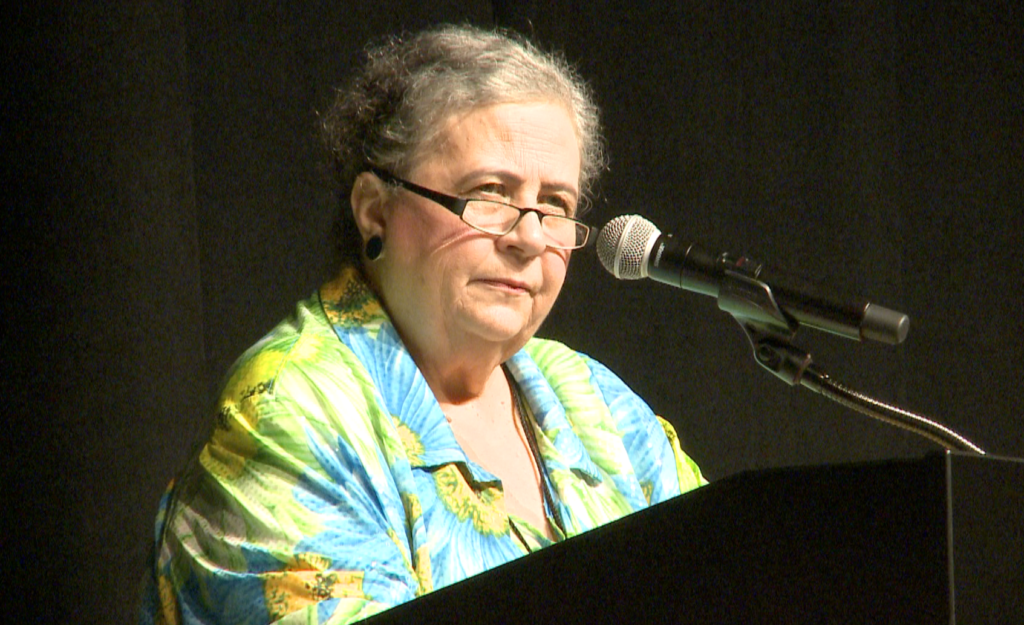
The chair of Alabama’s Democratic Party accused the party’s national chairman on Tuesday of trying to beat “Alabama into submission” by portraying the state party as in a shambles, just the latest twist in an ongoing dispute between state and national party officials. In a written statement, Alabama Democratic Party Chair Nancy Worley said there has been an all-out attack on the state party since she won last year’s election as chairwoman. She said her opponents include U.S. Sen. Doug Jones, who endorsed a different candidate after calling for new leadership. “From a continuous, ‘the sky is falling’ media assault on the party and its leadership, to the DNC’s withholding $10,000 per month to Alabama, they have bombarded the Alabama Democratic Party from every side” the statement released by the state party and Worley read. In a letter Monday, Democratic National Committee Chairman Tom Perez said the national party was keeping funds from the state party because it had “fallen far short of meeting its basic obligations to develop an effective strategic plan and build the necessary infrastructure for success.” He said Alabama is the only state where monthly party development funds have been withheld because of problems. “The ADP has chronically underperformed in virtually every aspect of operation,” Perez wrote. Worley called the letter just another example of her opponents “stirring the pot against the Alabama Democratic Party.” The DNC in February ordered Alabama to hold new chair and vice-chair elections after finding there were irregularities with Worley’s election. The national committee also ordered the state party to revise its bylaws. The DNC last month stripped Worley and Vice Chair Randy Kelley of their seats on the DNC because of missed deadlines to hold the new elections and get new bylaws approved. Both the DNC and the Jones campaign declined to comment on Worley’s statement. Republished with the permission of the Associated Press.
DNC: Alabama democratic party hasn’t met basic obligations

The chairman of the Democratic National Committee said Monday that the Alabama Democratic Party is failing to meet basic obligations and national party officials have withheld funds because of the chronic problems. DNC Chairman Tom Perez delivered the rebuke in a letter outlining the status of challenges filed against the state party. He said Alabama is the only state where monthly party development funds have been withheld because of problems. “Alabama has fallen far short of meeting its basic obligations to develop an effective strategic plan and build the necessary infrastructure for success,” Perez wrote in a letter. “The ADP has chronically underperformed in virtually every aspect of operation.” The harsh assessment was the latest sign of frustration by national party officials with the leadership of the Alabama party. Perez wrote the letter to Jefferson County Democratic Party Chair Richard Mauk who had inquired about the status of two challenges against state party leadership. The DNC last month stripped Alabama Democratic Party Chair Nancy Worley and Vice Chair Randy Kelley of their seats on the DNC because of missed deadlines to hold new leadership elections and bring party bylaws into compliance. The DNC in February ordered the Alabama party to hold new elections for state party chair and vice-chair after finding multiple irregularities with Worley’s and Kelley’s election last year. Party officials also ordered the state party to develop an affirmative action plan and revise bylaws to provide representation of other minorities, not just African Americans. Perez wrote that since September 2018 the DNC has withheld a monthly payment of at least $10,000 from the Alabama party because of the problems. “We have not had to take this serious action with any other state party,” he wrote.Worley did not return a text message seeking comment. The letter also indicated the state’s participation in Democrats’ presidential nominating convention next year could be in jeopardy. A DNC panel had said it won’t approve the state’s delegate selection plan until the state party holds new leadership elections under properly approved bylaws. Perez told Mauk that they are willing to help. “Democrats can win and are winning in Alabama,” Perez wrote. “But we need a functional state party.” Republished with the permission of the Associated Press.


